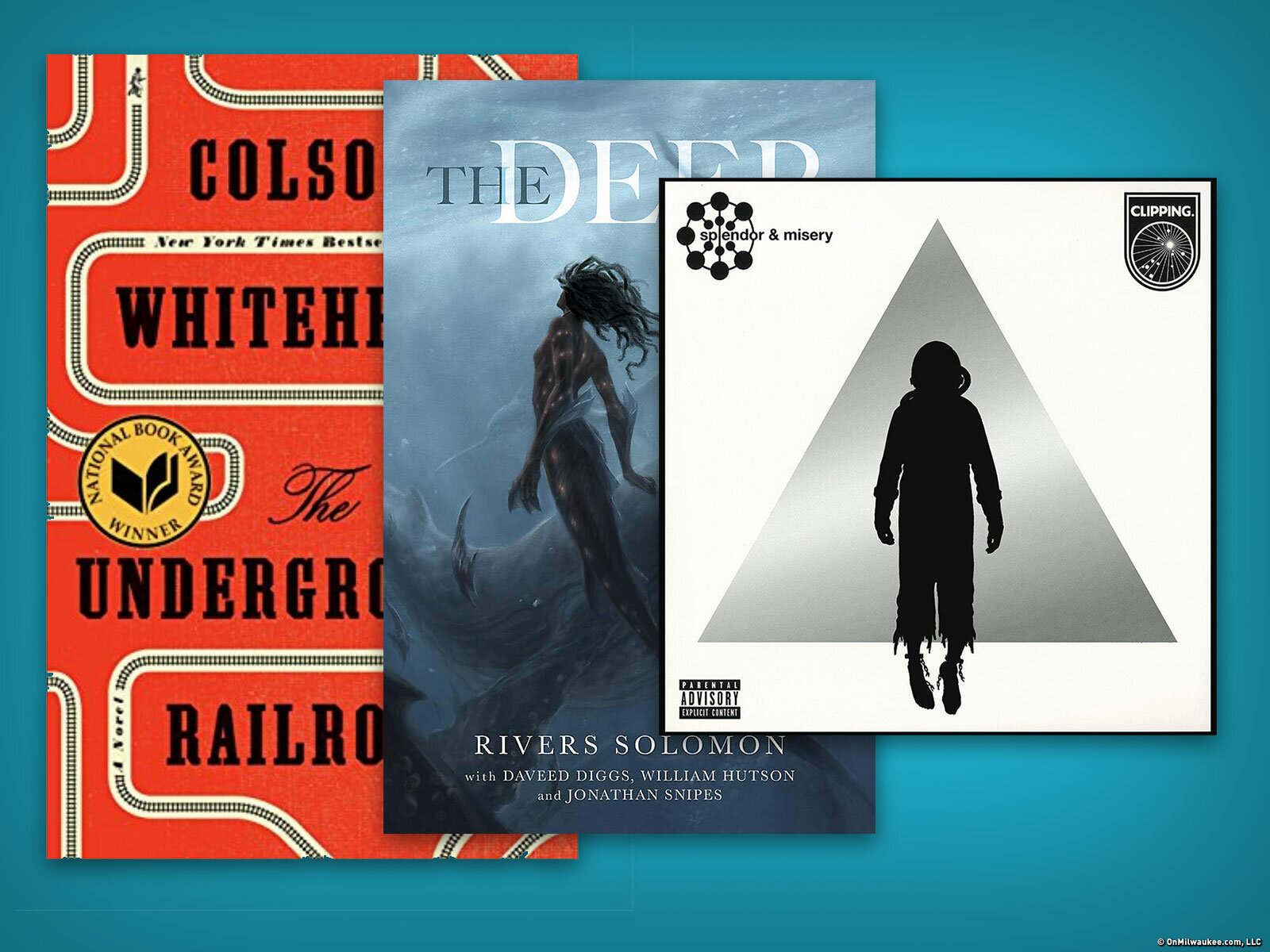Two important points to understand: Reckoning with the atrocities of slavery is not something Americans are good at, but it's something we must do with much more regularity. And second, fantasy fiction has long been a cove of white, pre-colonial escapism with a large amount of creative energy invested into an astounding assortment of unusual monsters and very little on character diversity.
But the works of five creators – writer Colson Whitehead, the musical outfit Clipping (comprised of Daveed Diggs, Johnathan Snipes and William Huston) and writer Rivers Solomon – have drawn inspiration from this point in our horrible history and composed beautiful stories of tragedy, sadness and loneliness, all cut with devices of fantasy and adventure, creating unique visions of alternate pasts and contemplative futures.
From a real-life, actual, underground railroad, to a race of mer-folk evolved from drowned mothers, to an outer space slave revolt, these three stories address real histories but blend them with alternate timelines and build modern fantasy by branching from real history, imagining futuristic fights for freedom through oblivion, encouraging understanding, creating empathy and inspiring compassion.
"The Underground Railroad" by Colson Whitehead
"The Underground Railroad" by Colson Whitehead follows the journey of Cora, an enslaved African, as she escapes her oppression and seeks freedom via an actual, physical, underground train. Things get more complicated when she kills a young white boy who tries to recapture her and soon discovers she's being tailed by a relentless slave catcher who had previously failed to catch Cora's mother.
This book is perhaps the least fantastical of the three (though it is no less fantastic) but the hook is that as Cora is ushered ever northward, Whitehead bends a few hundred years of the black experience timeline into one journey with stops along the line that features a different experience on every stop. Each is a new challenge to true American freedom: slavery, the black Holocaust, the Tuskegee syphilis experiments and the eugenics movement. But while the story emphasizes the brutality of such a journey, it is ultimately an inspiring tale of courage.
"The Underground Railroad" won the Pulitzer Prize for Fiction in 2017.
"Splendor & Misery" by Clipping
In this Afrofuturist album by Clipping (Daveed Diggs, Johnathan Snipes and William Hutson), we are introduced to the in-case-of-emergency instructions of a slaver's spaceship (rapped with incredible speed by Diggs) as an enslaved person, referred to as "Cargo #2331," wakes from stasis and kills the ship's crew, then jettisons into the unknown. The album subsequently follows the developing relationship between the rebel and the ship's AI and muses about escaping oppression, battling loneliness and isolation, and finding freedom in oblivion.
Until this album, Clipping had been known for their blend of harsh noise, experimental electronics and rap, at times pushing the goodwill of their listeners to the edge. But their ability to tell immersive stories were always comprehensive. "Splendor & Misery" still takes advantage of using found sounds and startling noises in creative ways, but they toned down the auditory attacks, kicked out the corners of musical possibilities and, perhaps drawing from Diggs' time in "Hamilton," developed a more long-form, theatrical album structure.
"Splendor & Misery" was nominated for the 2017 Hugo Award for Best Dramatic Presentation, Short Form
"The Deep" by Rivers Solomon
"The Deep" by Rivers Solomon is another Afrofuturist story – coincidentally based on another Clipping song that imagines a society of mer-folk that had grown from the descendants of drowned African mothers who were thrown overboard by slave traders when it was discovered they were pregnant (and, therefore, a profit liability).
The main character, Yetu, is a young historian who is put in charge of maintaining the history of their pain. But it's too much for her to bear in singularity and she revolts, ultimately running into the encroaching race of "two legs" as they search for oil. The story is a thoughtful examination of cultural trauma and family dynamics.
The conception of "The Deep" developed via a winding history of artists building on top of each other, and with any luck, it won't stop here, expanding into something of a shared universe like you see in comic books. As the story goes, "This American Life" ran a podcast on the topic of Afrofuturism and, for the episode, commissioned a song by Clipping. In writing the song, the members of Clipping were inspired by the bad Drexcia, who had written music about a utopian underwater civilization in the mid-90s. After the episode ran, Rivers Solomon was then inspired to write the book. Then Clipping returned, re-inspired by the book to write more songs on the subject.
"The Deep" (the song) was nominated for a Hugo Award for "Best Dramatic Presentation – Short Form" while "The Deep" (the book) was nominated for a Hugo Award for "Best Novella."
Jason McDowell grew up in central Iowa and moved to Milwaukee in 2000 to attend the Milwaukee Institute of Art and Design.
In 2006 he began working with OnMilwaukee as an advertising designer, but has since taken on a variety of rolls as the Creative Director, tackling all kinds of design problems, from digital to print, advertising to branding, icons to programming.
In 2016 he picked up the 414 Digital Star of the Year award.
Most other times he can be found racing bicycles, playing board games, or petting dogs.







